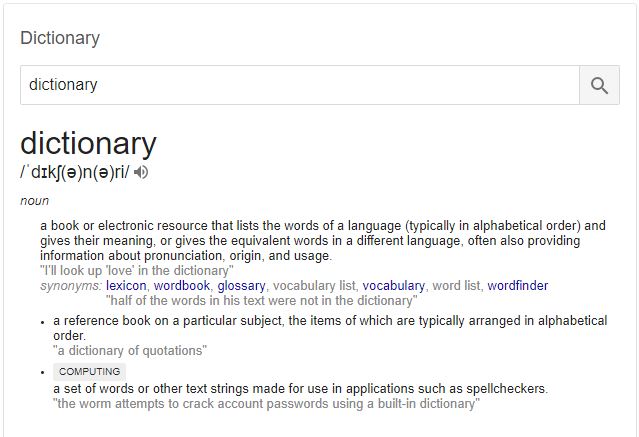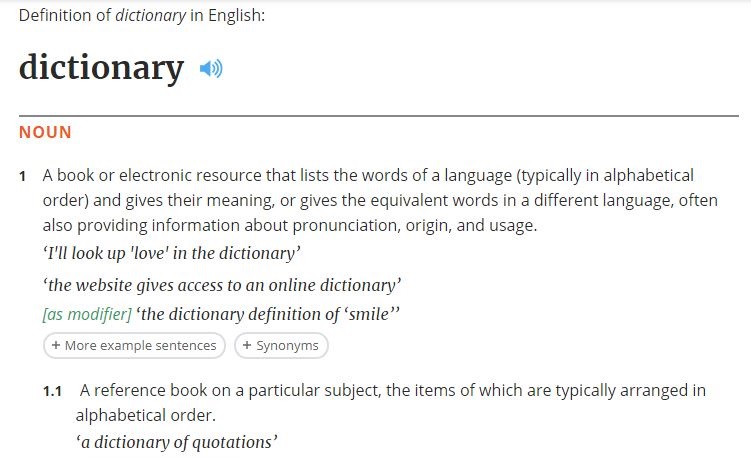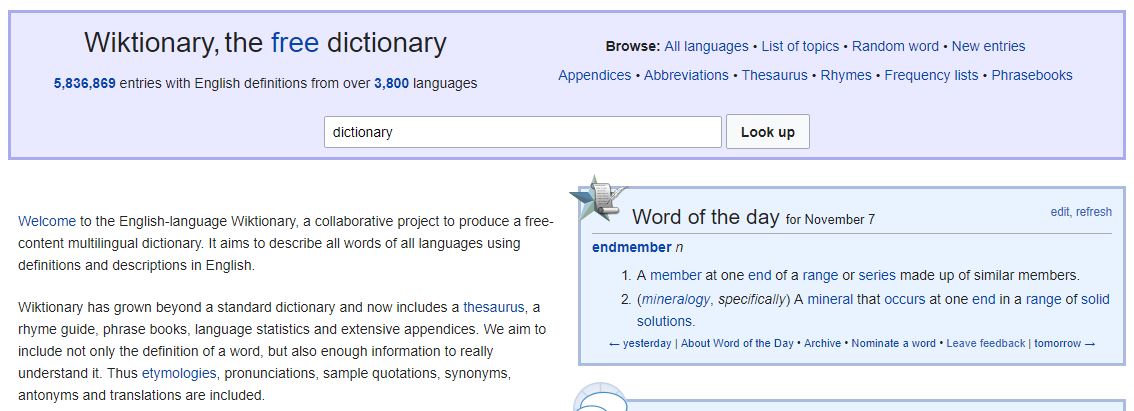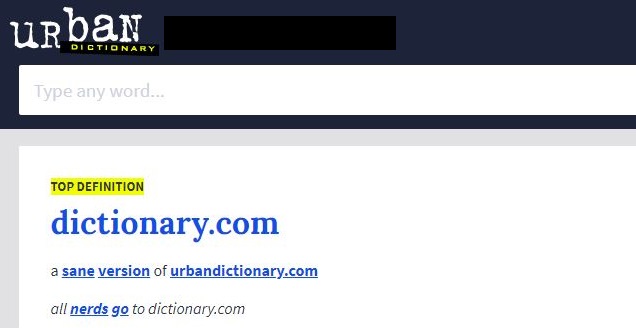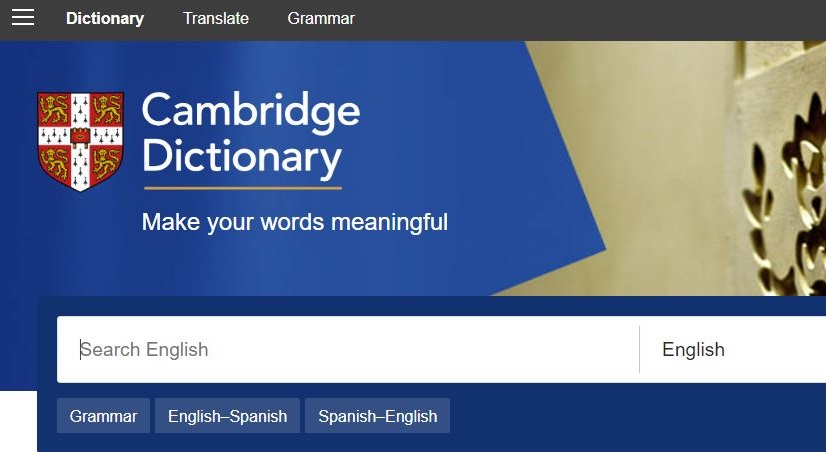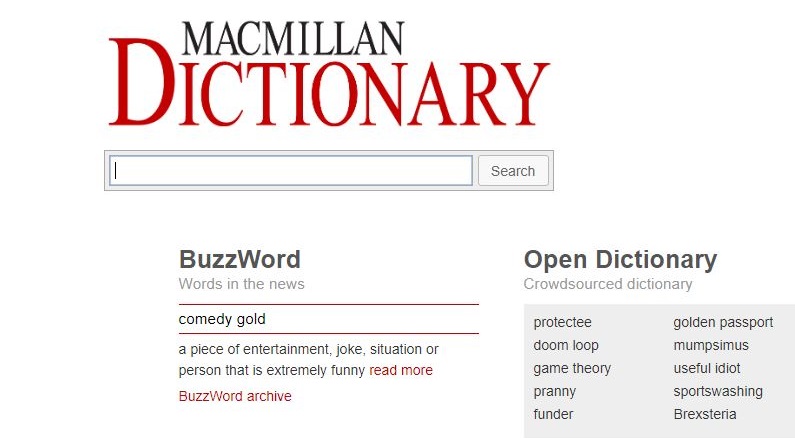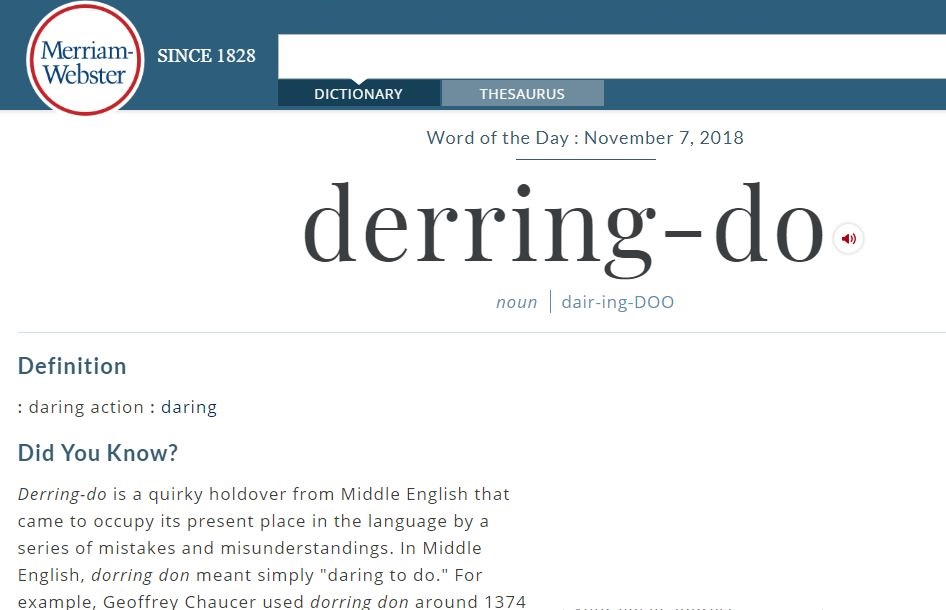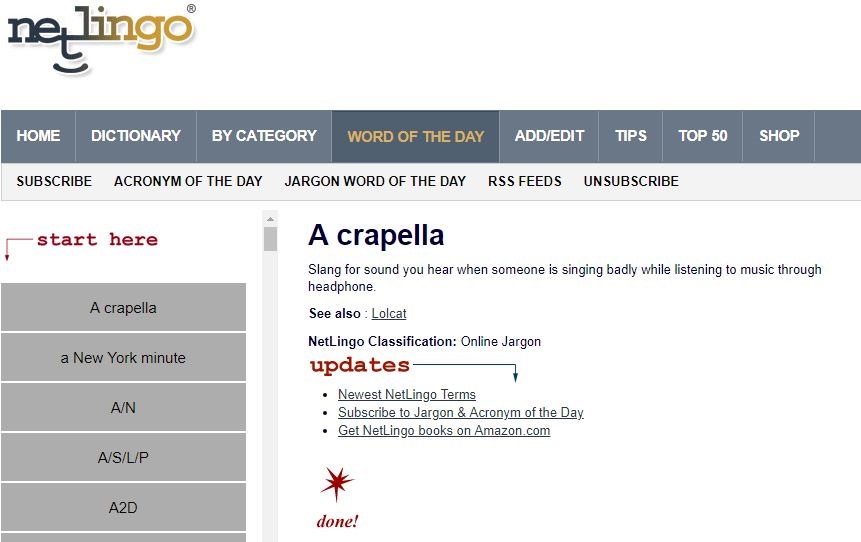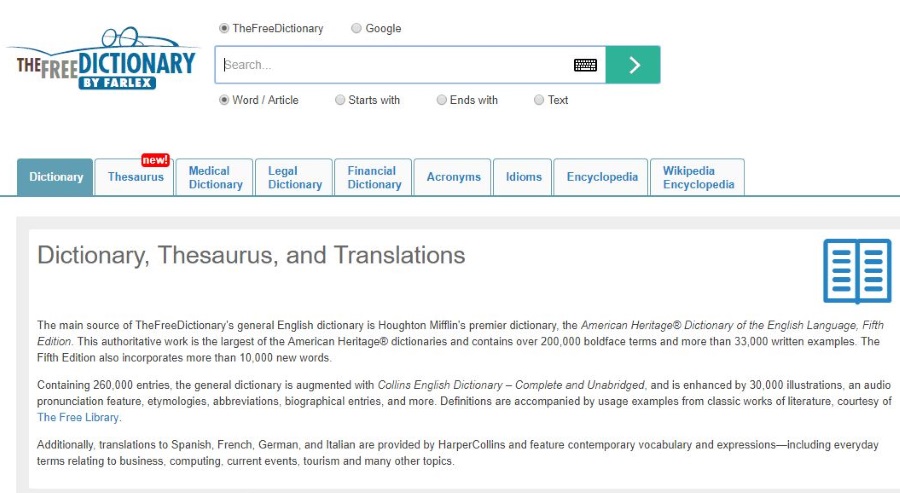With vast numbers of online dictionaries available, it is good to take note of the best ones and their main advantage on different scenarios.
The following dictionaries are the best so far and their main features are discussed to make it easier for someone to pick according to the functions they want performed.
1. Google Dictionary
This is always the first option that many people opt to. When one types google dictionary in the google search tool, google automatically brings a list of dictionaries available including google dictionary. It is amongst the most expansive online dictionaries available. With an added advantage of having other different languages. It literally contains meaning of nearly every English word available. It also contains a variety of features like related phrases, example sentences, definitions, voice pronunciation amongst others. One of the main advantages of using this dictionary is the brand that google has created for itself. Highly recommended.
2. Oxford Dictionary
This dictionary is mainly used by students and learners, however it can be used by anyone. It is easy to use and contains both British and American English. Some of the features include pictures (which really comes in handy for better understanding and elaboration of things), synonyms, example sentences and others. It’s amongst one of the oldest, most used and trusted online dictionary. This dictionary can come in handy when writing a research paper or a thesis for clarification purposes and understanding words better.
3. Wiktionary
This dictionary was formed under the same ideology of Wikipedia. It is easy to access and contains simple terms to use. However, many people do not believe in its credibility since a person can edit a page. Which is the same scenario as Wikipedia. Although, it does have a community of editors who ensure that the information contained there is accurate. It aims at becoming better every passing day as more features are integrated in the dictionary to make it better like thesaurus, phrase books, extensive appendices and language statistics.
4. Urban Dictionary
This dictionary is mainly used to search for the urban words, as its name suggests. Any slang will have its definition here. It might not come in handy under academic purposes, but it will be really helpful when someone comes across an urban word or a slang on the social media and they do not know the meaning. It mainly comprises of words that are used on the streets and not in a formal setting. Most of the words found here are not found on the standard dictionary and it can save you time of searching for a new word that is recently invented from the streets or borrowed from the showbiz world.
5. Cambridge Dictionary
This is amongst one of the most respected dictionaries around. It can be used by learners and even people who are looking for definition of casual words. The online version is made up of different dictionaries functions and its website is very wide. The online versions include International Dictionary of Idioms, the Cambridge Dictionary of American English, the Cambridge International Dictionary of Phrasal Verbs and the Cambridge Learners Dictionary. Some of the online features include thesaurus, pronunciation, translation, phrasal verbs, idioms and others. It’s one of the most serious dictionaries mainly used for official and academic purposes.
6. Macmillan Dictionary
This is a reference dictionary for all English speaking people. It is free and provides online thesaurus that is fully integrated and consists of synonyms and related words. The thesaurus contains dictionary entries integrated under it. The best online dictionary to learn something new every day. With its synonym feature, a user can learn new term on different words that are featured on the dictionary. It also does contain a physical dictionary. Its main users comprises of learners and people in official setting.
7. Dictionary.com
It is one of the best dictionaries around. Its offline dictionary is also amongst the best English dictionary app. It has existed for over 20 years and has gained trust from its million users worldwide. It contains vast features like slang phrases, audio pronunciation, synonyms, idioms, word origins, word games, example sentences and professional terms such as medical terms and others. It’s one of the leading online sources of terms and definitions of words. With its domain name already introducing the site, it has a wide range of users who find the site useful and of great benefit.
8. Merriam-Webster Dictionary
This is one of the most accurate online dictionaries. Although not commonly known, it has one of the highest most credible information. The definition of its words are of high pedigree. Although it does not contain much features compared to the other dictionaries, it has pronunciation, grammar tips, synonyms, thesaurus, medical dictionary and Spanish to English translation. Although you can get all the help online, it still can work offline.
9. NetLingo
As it names suggests, this sites gives meaning and definition of internet lingo being used. In this case, lingo is used to mean language. It also contains a list of acronyms that are mainly used on the internet these days. Its purpose is to serve on the casual meaning of words and gives a better understanding on the short acronyms and what they stand for.
10. The Free Dictionary
This is a free online English dictionary that allows you to search for definition of words or characters. Some of the features include thesaurus, idioms, abbreviations, encyclopedia, synonyms, translator that works with languages that are common like German and French. It also contains medical and financial terms for people in such profession. It also allows users to create their own personal homepage by adding and removing terms through drag and drop capabilities.
3,000 Core Vocabulary Words
Our editors have identified 3,000 English words that are most important to know. Study this list to improve your vocabulary.
Featured topics
- 100 Essential Words for the TOEFL: 100 must-have words to study for the TOEFL test
- Sports: Words for popular American sports
- Air Travel: Useful words for traveling on airplanes and through airports
- The Environment: Vocabulary related to environmental science and climate change
- Family members: Relatives and other important people
- Jobs/Professions: Types of jobs and careers
- Legal English: Vocabulary for court trials and other legal proceedings
- Words for emotions: Different feelings that people have
- Parts of the Body : External parts of the human body
- Noncount nouns: Nouns that cannot be counted or be plural
- Time adverbs: Words that tell when and how often
- Health: Words for common medical problems
- Personality types: Adjectives that describe behavior and personality
- Periods of time: Long and short amounts of time
- Employment: Words for work in a company
- Academic writing: About the structure and content of academic writing
- College and university life: Vocabulary for college and university students
- Economics: Concepts in economics
- Weather: Terms that describe weather conditions
Browse the full list alphabetically
- a
- b
- c
- d
- e
- f
- g
- h
- i
- j
- k
- l
- m
- n
- o
- p
- q
- r
- s
- t
- u
- v
- w
- x
- y
- z
Learn how to improve your English vocabulary, listening, and speaking at the same time using the 3000 most commonly used words in English.
Fortunately, you don’t have to learn them all to become fluent in English. Americans use around 2500 – 3000 of the most common words in their daily lives. If you know these 3000 most common words, you can understand at least 95% of all conversations, e-mails, newspapers, and books.
Sounds great! But what is the most effective way to learn these words?
Focus on example sentences when learning vocabulary. Here’s why?
When it comes to learning English vocabulary, the most important thing
you need to focus on are
example sentences because they help you to improve all your English skills — including vocabulary, listening, speaking, and writing.
If you want to speak English fluently, learn with your ears, not with your eyes
Learning English can be broken down into two parts: input and output. Input consists of reading and listening while output consists of writing and speaking. The more input you get, the more output you can produce. It’s that simple.
Here’s the little secret you probably don’t know yet:
Repetition is the secret to English fluency
If you want to quickly achieve fluency level — to speak English easily, fluently and automatically, you’ll need to do one more thing:
Learn deeply through lots of repetition.
It means that you will need to listen to every example sentence many, many times, until you MASTER it. Don’t listen just one time or a few times. It’s not enough. You will forget it very soon.
You may know how to use a word to make a correct sentence, but here’s the thing: Can you use it quickly, easily, and automatically?
If the answer is no, you need to repeat more. You must listen to that example sentence again and again.
Don’t ignore this simple secret. This is how you will achieve automatically fast speaking.
FREE English Lessons — 3000 Most Frequently Used Words in English
In the following section, you will find around 3000 free lessons for the 3000 most commonly used words in English. Each lesson consists of the definition (meaning) of the word, the audio pronunciation, and many example sentences with high-quality audio.
Listen to (and repeat) each lesson many times — and watch how fast your English speaking improves!
Enjoy the lessons!
P/S: Check out the Resources page for our recommended courses and lessons.
Спорим, вы знаете их практически все?
В этой статье вы найдете 1000 слов на английском, которые употребляются носителями языка чаще всего. Мы дадим эту тысячу английских слов с транскрипцией и переводом, чтобы вы заодно потренировались и в произношении.
Ранее мы уже говорили о том, какой словарный запас необходим, чтобы легко и свободно общаться на английском языке. Для базового понимания речи и простого выражения своих мыслей потребуется знать порядка 1000 слов. Но те, кто учит английской язык регулярно, постоянно пополняют свой лексикон.
Давайте разберемся, что же это за 1000 популярных английских слов такие? Common words (распространенные слова) — это те, которые чаще всего встречаются как в речи носителей какого-либо языка, так и в печатных СМИ, фильмах, на телевидении да и во всем, что окружает человека. Популярность того или иного слова легко объяснить многозначностью большинства английских слов.
Если сравнивать разные языки, то большинство популярных слов у них похожи. Это местоимения, глаголы и существительные, которые мы и сами используем чаще всего. Так что посмотрев перевод 1000 самых используемых слов, вы увидите, что вам знакомы большинство из них.
Перед вами — 1000 самых распространенных английских слов. Проверим, сколько из них вы уже знаете?
- as [æz] — как
- I [aɪ] — я
- his [hɪz] — его
- that [ðæt] — что / тот
- he [hiː] — он
- was [wɒz] — был
- for [fɔːr] — для
- on [ɒn] — на
- are [ɑːr] — являются
- with [wɪð] — с
- they [ðeɪ] — они
- be [biː] — быть
- at [ət] — на
- one [wʌn] — один
- have [hæv] — иметь
- this [ðɪs] — это
- from [frɒm] — из
- by [baɪ] — от
- hot [hɒt] — горячий / жарко
- word [wɜːd] — слово
- but [bʌt] — но
- what [wɒt] — что
- some [sʌm] — некоторый
- is [ɪz] — является
- it [ɪt] — это
- you [juː] — ты
- or [ɔːr] — или
- had [hæd] — имел
- the [ðiː]
- of [əv] — из / о
- to [tuː] — в / к
- and [ænd] — и
- a [ə]
- in [ɪn] — в
- we [wiː] — мы
- can [kæn] — может
- out [aʊt] — из / вне
- other [ˈʌð.ər] — другой
- were [wɜːr] — были
- which [wɪtʃ] — который
- do [duː] — делать
- their [ðeər] — их
- time [taɪm] — время
- if [ɪf] — если
- will [wɪl] — будет
- how [haʊ] — как
- said [sed] — говорить
- an [æn]
- each [iːtʃ] — каждый
- tell [tel] — говорить
- does [dʌz] — делает
- set [set] — задавать / комплект
- three [θriː] — три
- want [wɒnt] — хотеть
- air [eər] — воздух
- well [wel] — хорошо
- also [ˈɔːl.səʊ] — также
- play [pleɪ] — играть
- small [smɔːl] — маленький
- end [end] — конец
- put [pʊt] — ставить
- home [həʊm] — дом
- read [riːd] — читать
- hand [hænd] — рука
- port [pɔːt] — порт
- large [lɑːdʒ] — большой
- spell [spel] — читать по буквам / орфография
- add [æd] — добавлять
- even [ˈiː.vən] — даже
- land [lænd] — земля
- here [hɪər] — здесь
- must [mʌst] — должен
- big [bɪɡ] — большой
- high [haɪ] — высокий
- such [sʌtʃ] — такой
- follow [ˈfɒl.əʊ] — следовать
- act [ækt] — действовать
- why [waɪ] — почему
- ask [ɑːsk] — спрашивать
- men [men] — люди
- change [tʃeɪndʒ] — менять
- went [went] — отправился
- light [laɪt] — свет / легкий
- kind [kaɪnd] — добрый / разновидность
- off [ɒf] — от / выключенный
- need [niːd] — необходимость
- house [haʊs] — дом
- picture [ˈpɪk.tʃər] — картина / фото
- try [traɪ] — пробовать / пытаться
- us [ʌs] — нас
- again [əˈɡen] — снова
- animal [ˈæn.ɪ.məl] — животное
- point [pɔɪnt] — точка
- mother [ˈmʌð.ər] — мать
- world [wɜːld] — мир
- near [nɪər] — близко
- build [bɪld] — строить
- self [self] — себя
- earth [ɜːθ] — земля
- father [ˈfɑː.ðər] — отец
- any [ˈen.i] — любой
- new [njuː] — новый
- work [wɜːk] — работа
- part [pɑːt] — часть
- take [teɪk] — брать
- get [get] — получать
- place [pleɪs] — место
- made [meɪd] — сделать
- live [lɪv] — жить
- where [weər] — где
- after [ˈɑːf.tər] — после
- back [bæk] — назад
- little [ˈlɪt.əl] — немного
- only [ˈəʊn.li] — только
- round [raʊnd] — круглый / вокруг
- man [mæn] — мужчина
- year [jɪər] — год
- came [keɪm] — пришел
- show [ʃəʊ] — показывать
- every [ˈev.ri] — каждый
- good [ɡʊd] — хороший
- me [miː] — мне
- give [ɡɪv] — давать
- our [aʊər] — наш
- under [ˈʌn.dər] — под
- name [neɪm] — имя
- very [ˈver.i] — очень
- through [θruː] — через
- just [dʒʌst] — только / просто
- form [fɔːm] — вид, форма / образовывать
- sentence [ˈsen.təns] — предложение
- great [ɡreɪt] — отличный
- think [θɪŋk] — думать
- say [seɪ] — говорить
- help [help] — помогать, помощь
- low [ləʊ] — низкий
- line [laɪn] — линия, черта
- differ [ˈdɪf.ər] — отличаться
- turn [tɜːn] — поворачивать
- cause [kɔːz] — причина
- much [mʌtʃ] — много
- mean [miːn] — значить / подлый / средний
- before [bɪˈfɔːr] — до
- move [muːv] — двигать
- right [raɪt] — право / верный
- boy [bɔɪ] — мальчик
- old [əʊld] — старый
- too [tuː] — тоже
- same [seɪm] — также
- she [ʃiː] — она
- all [ɔːl] — все
- there [ðeər] — там
- when [wen] — когда
- up [ʌp] — вверх / подниматься
- use [juːz] — использовать
- your [jɔːr] — твой
- way [weɪ] — путь
- about [əˈbaʊt] — о
- many [ˈmen.i] — много
- then [ðen] — затем
- them [ðem] — их
- write [raɪt] — писать
- would [wʊd] — бы / было бы
- like [laɪk] — нравиться
- so [səʊ] — так
- these [ðiːz] — эти
- her [hɜːr] — ее
- long [lɒŋ] — долго / длинный
- make [meɪk] — делать
- thing [θɪŋ] — вещь
- see [siː] — видеть
- him [hɪm] — его
- two [tuː] — два / двое
- has [hæz] — имеет
- look [lʊk] — смотреть / взгляд
- more [mɔːr] — больше
- day [deɪ] — день
- could [kʊd] — мог
- go [ɡəʊ] — идти
- come [kʌm] — приходить
- did [dɪd] — сделал
- number [ˈnʌm.bər] — номер
- sound [saʊnd] — звук
- no [nəʊ] — нет
- most [məʊst] — самый / большинство
- people [ˈpiː.pəl] — люди
- my [maɪ] — мой
- over [ˈəʊ.vər] — над
- know [nəʊ] — знать
- water [ˈwɔː.tər] — вода
- than [ðæn] — чем
- call [kɔːl] — звонить / звонок
- first [ˈfɜːst] — первый
- who [huː] — кто
- may [meɪ] — может
- down [daʊn] — вниз
- side [saɪd] — сторона
- been [biːn] — был
- now [naʊ] — сейчас
- find [faɪnd] — найти
- head [hed] — голова
- stand [stænd] — стоять
- own [əʊn] — свой / владеть
- page [peɪdʒ] — страница
- should [ʃʊd] — должен
- country [ˈkʌn.tri] — страна
- found [faʊnd] — найденный
- answer [ˈæn·sər] — ответ / отвечать
- school [skuːl] — школа
- grow [ɡrəʊ] — расти
- study [ˈstʌd.i] — изучать
- still [stɪl] — все еще
- learn [lɜːn] — учиться
- plant [plɑːnt] — растение / сажать
- cover [ˈkʌv.ər] — накрывать / обложка
- food [fuːd] — еда
- sun [sʌn] — солнце
- four [fɔːr] — четыре
- between [bɪˈtwiːn] — между
- state [steɪt] — состояние, государство, штат
- keep [kiːp] — держать, продолжать
- eye [aɪ] — глаз
- never [ˈnev.ər] — никогда
- last [lɑːst] — последний
- let [let] — позволять
- thought [θɔːt] — мысль / думал
- city [ˈsɪt.i] — город
- tree [triː] — дерево
- cross [krɒs] — пересекать / крест
- farm [fɑːm] — ферма
- hard [hɑːd] — тяжелый / твердый
- start [stɑːt] — начинать
- might [maɪt] — может быть / мощь
- story [ˈstɔː.ri] — история
- saw [sɔː] — увидел / пила
- far [fɑːr] — далеко
- sea [siː] — море
- draw [drɔː] — рисовать
- left [left] — лево / оставил
- late [leɪt] — поздно
- run [rʌn] — бежать
- don’t [dəʊnt] — не
- while [waɪl] — в то время, как
- press [pres] — нажимать / давить
- close [kləʊz] — близко / закрывать
- night [naɪt] — ночь
- real [rɪəl] — реальный
- life [laɪf] — жизнь
- few [fjuː] — несколько
- north [nɔːθ] — север
- book [bʊk] — книга
- carry [ˈkær.i] — нести
- took [tʊk] — взял
- science [ˈsaɪ.əns] — наука
- eat [iːt] — есть
- room [ruːm] — комната
- friend [frend] — друг
- began [bɪˈɡæn] — началось
- idea [aɪˈdɪə] — идея
- fish [fɪʃ] — рыба
- mountain [ˈmaʊn.tɪn] — гора
- stop [stɒp] — остановка / останавливать
- once [wʌns] — однажды
- base [beɪs] — базовый / основывать
- hear [hɪər] — слышать
- horse [hɔːs] — лошадь
- cut [kʌt] — резать
- sure [ʃɔːr] — конечно / уверен
- watch [wɒtʃ] — смотреть / часы
- colour [ˈkʌl.ər] — цвет
- face [feɪs] — лицо
- wood [wʊd] — дерево
- main [meɪn] — главный
- open [ˈəʊ.pən] — открыть
- seem [siːm] — казаться
- together [təˈɡeð.ər] — вместе
- next [nekst] — следующий
- white [waɪt] — белый
- children [ˈtʃɪl.drən] — дети
- begin [bɪˈɡɪn] — начинать
- got [ɡɒt] — получил
- walk [wɔːk] — гулять / прогулка
- example [ɪɡˈzɑːm.pəl] — пример
- ease [iːz] — легкость / облегчать
- paper [ˈpeɪ.pər] — бумага
- group [ɡruːp] — группа
- always [ˈɔːl.weɪz] — всегда
- music [ˈmjuː.zɪk] — музыка
- those [ðəʊz] — те
- both [bəʊθ] — оба
- mark [mɑːk] — отметка / отмечать
- often [ˈɒf.ən] — часто
- letter [ˈlet.ər] — письмо
- until [ənˈtɪl] — до тех пор
- mile [maɪl] — миля
- river [ˈrɪv.ər] — река
- car [kɑːr] — машина
- feet [fiːt] — ноги
- care [keər] — заботиться / уход
- second [ˈsek.ənd] — секунда
- enough [ɪˈnʌf] — достаточно / довольно
- plain [pleɪn] — простой
- girl [ɡɜːl] — девочка
- usual [ˈjuː.ʒu.əl] — обычно
- young [jʌŋ] — молодой
- ready [ˈred.i] — готовый
- above [əˈbʌv] — выше
- ever [ˈev.ər] — когда-либо
- red [red] — красный
- list [lɪst] — список
- though [ðəʊ] — хоть
- feel [fiːl] — чувствовать
- talk [tɔːk] — говорить
- bird [bɜːd] — птица
- soon [suːn] — скоро
- body [ˈbɒd.i] — тело
- dog [dɒɡ] — собака
- family [ˈfæm.əl.i] — семья
- direct [daɪˈrekt] — непосредственный / направлять
- pose [pəʊz] — поза / позировать
- leave [liːv] — покидать
- song [sɒŋ] — песня
- measure [ˈmeʒ.ər] — мера / измерять
- door [dɔːr] — дверь
- product [ˈprɒd.ʌkt] — продукт
- black [blæk] — черный
- short [ʃɔːt] — короткий
- numeral [ˈnjuː.mə.rəl] — числительное
- class [klɑːs] — класс / сорт
- wind [wɪnd] — ветер
- question [ˈkwes.tʃən] — вопрос
- happen [ˈhæp.ən] — случаться
- complete [kəmˈpliːt] — полный / завершенный
- ship [ʃɪp] — корабль
- area [ˈeə.ri.ə] — площадь / зона
- half [hɑːf] — половина
- rock [rɒk] — рок / камень / скала
- order [ˈɔː.dər] — заказ / порядок
- fire [faɪər]— огонь
- south [saʊθ] — юг
- problem [ˈprɒb.ləm] — проблема
- piece [piːs] — часть / кусок
- told [təʊld] — говорил
- knew [njuː] — знал
- pass [pɑːs] — проходить / передача
- since [sɪns] — с / поскольку
- top [tɒp] — верх / вершина
- whole [həʊl] — весь / целый
- king [kɪŋ] — король
- street [striːt] — улица
- inch [ɪntʃ] — дюйм
- multiply [ˈmʌl.tɪ.plaɪ] — умножать
- nothing [ˈnʌθ.ɪŋ] — ничего
- course [kɔːs] — курс / блюдо
- stay [steɪ] — оставаться
- wheel [wiːl] — колесо
- full [fʊl] — полный
- force [fɔːs] — сила / заставлять
- blue [bluː] — голубой / синий / грустный
- object [ˈɒb.dʒɪkt] — объект
- decide [dɪˈsaɪd] — решать
- surface [ˈsɜː.fɪs] — поверхность
- deep [diːp] — глубоко
- moon [muːn] — луна
- island [ˈaɪ.lənd] — остров
- foot [fʊt] — нога
- system [ˈsɪs.təm] — система
- busy [ˈbɪz.i] — занят
- test [test] — тест / проверять
- record [rɪˈkɔːd] — записывать
- boat [bəʊt] — лодка
- common [ˈkɒm.ən] — общий / обычный
- gold [ɡəʊld] — золото
- possible [ˈpɒs.ə.bəl] — возможный
- plane [pleɪn] — самолет / плоскость
- stead [sted] — место
- dry [draɪ] — сухой
- wonder [ˈwʌn.dər] — чудо / удивляться
- laugh [lɑːf] — смех / смеяться
- thousand [ˈθaʊ.zənd] — тысяча
- ago [əˈɡəʊ] — тому назад
- ran [ræn] — побежал
- check [tʃek] — проверять
- game [ɡeɪm] — игра
- shape [ʃeɪp] — форма
- equate [ɪˈkweɪt] — приравнивать
- OK [ˌəʊˈkeɪ] — хорошо
- miss [mɪs] — скучать / пропускать
- brought [brɔːt] — привел
- heat [hiːt] — жара, высокая температура
- snow [snəʊ] — снег
- tire [taɪər] — шина / утомлять
- bring [brɪŋ] — приносить
- yes [jes] — да
- distant [ˈdɪs.tənt] — отдаленный
- fill [fɪl] — наполнять
- east [iːst] — восток
- paint [peɪnt] — краска / красить
- language [ˈlæŋ.ɡwɪdʒ] — язык
- among [əˈmʌŋ] — среди
- unit [ˈjuː.nɪt] — единица
- power [paʊər] — мощность / сила
- town [taʊn] — город
- fine [faɪn] — отлично
- certain [ˈsɜː.tən] — определенный
- fly [flaɪ] — летать
- fall [fɔːl] — падать / осень
- lead [liːd] — вести / руководить
- cry [kraɪ] — плакать
- dark [dɑːk] — темный, темнота
- machine [məˈʃiːn] — машина / механизм
- note [nəʊt] — примечание / отмечать
- wait [weɪt] — ждать
- plan [plæn] — план
- figure [ˈfɪɡ.ər] — цифра / фигура
- star [stɑːr] — звезда
- box [bɒks] — коробка
- noun [naʊn] — существительное
- field [fiːld] — поле
- rest [rest] — остальное / отдыхать
- correct [kəˈrekt] — поправлять / правильный
- able [ˈeɪ.bəl] — в состоянии / способный
- pound [paʊnd] — фунт
- done [dʌn] — сделанный
- beauty [ˈbjuː.ti] — красота
- drive [draɪv] — водить
- stood [stʊd] — стоял
- contain [kənˈteɪn] — содержать
- front [frʌnt] — перед
- teach [tiːtʃ] — обучать
- week [wiːk] — неделя
- final [ˈfaɪ.nəl] — финал / последний
- gave [ɡeɪv] — дал
- green [ɡriːn] — зеленый
- oh [əʊ] — ох
- quick [kwɪk] — быстро
- develop [dɪˈvel.əp] — развивать
- ocean [ˈəʊ.ʃən] — океан
- warm [wɔːm] — тепло
- free [friː] — свободный
- minute [ˈmɪn.ɪt] — минута
- strong [strɒŋ] — сильный
- special [ˈspeʃ.əl] — особый
- mind [maɪnd] — разум / возражать
- behind [bɪˈhaɪnd] — позади
- clear [klɪər] — ясный / понятно
- tail [teɪl] — хвост
- produce [prəˈdʒuːs] — производить
- fact [fækt] — факт
- space [speɪs] — пространство / космос
- heard [hɜːd] — слышал
- best [best] — лучший
- hour [aʊər] — час
- better [ˈbet.ər] — лучше
- true [truː] — правда
- during [ˈdʒʊə.rɪŋ] — в течение
- hundred [ˈhʌn.drəd] — сотня
- five [faɪv] — пять
- remember [rɪˈmem.bər] — помнить
- step [step] — шаг
- early [ˈɜː.li] — ранний / рано
- hold [həʊld] — держать
- west [west] — запад
- ground [ɡraʊnd] — земля
- interest [ˈɪn.trəst] — интерес
- reach [riːtʃ] — достигать
- fast [fɑːst] — быстро
- verb [vɜːb] — глагол
- sing [sɪŋ] — петь
- listen [ˈlɪs.ən] — слушать
- six [sɪks] — шесть
- table [ˈteɪ.bəl] — стол
- travel [ˈtræv.əl] — путешествовать
- less [les] — меньше
- morning [ˈmɔː.nɪŋ] — утро
- ten [ten] — десять
- simple [ˈsɪm.pəl] — просто / простой
- several [ˈsev.ər.əl] — несколько
- vowel [vaʊəl] — гласный (звук)
- towards [twoʊrdz] — к / по направлению к
- war [wɔːr] — война
- lay [leɪ] — лежать
- against [əˈɡenst] — против
- pattern [ˈpæt.ən] — узор
- slow [sləʊ] — медленно / медленный
- center [ˈsen.tər] — центр
- love [lʌv] — любовь
- person [ˈpɜː.sən] — человек
- money [ˈmʌn.i] — деньги
- serve [sɜːv] — обслуживать
- appear [əˈpɪər] — появляться
- road [rəʊd] — дорога
- map [mæp] — карта
- rain [reɪn] — дождь
- rule [ruːl] — правило
- govern [ˈɡʌv.ən] — управлять
- pull [pʊl] — тянуть
- cold [kəʊld] — холодный
- notice [ˈnəʊ.tɪs] — уведомление / замечать
- voice [vɔɪs] — голос
- energy [ˈen.ə.dʒi] — энергия
- hunt [hʌnt] — охотититься
- probable [ˈprɒb.ə.bəl] — вероятный
- bed [bed] — кровать
- brother [ˈbrʌð.ər] — брат
- egg [eɡ] — яйцо
- ride [raɪd] — ездить / поездка
- cell [sel] — клетка / мобильный (амер.)
- believe [bɪˈliːv] — верить
- perhaps [pəˈhæps] — возможно
- pick [pɪk] — выбирать
- sudden [ˈsʌd.ən] — внезапный
- count [kaʊnt] — считать
- square [skweər] — квадрат / площадь
- reason [ˈriː.zən] — причина
- length [leŋθ] — длина
- represent [ˌrep.rɪˈzent] — представлять
- art [ɑːt] — искусство
- subject [ˈsʌb.dʒekt] — предмет
- region [ˈriː.dʒən] — регион
- size [saɪz] — размер
- vary [ˈveə.ri] — меняться / варьировать
- settle [ˈset.əl] — селиться
- speak [spiːk] — говорить
- weight [weɪt] — вес
- general [ˈdʒen.ər.əl] — главный / общий
- ice [aɪs] — лед
- matter [ˈmæt.ər] — иметь значение / предмет / материя
- circle [ˈsɜː.kəl] — круг
- pair [peər] — пара
- include [ɪnˈkluːd] — включать в себя
- divide [dɪˈvaɪd] — разделять
- syllable [ˈsɪl.ə.bəl] — слог
- felt [felt] — чувствовал
- grand [ɡrænd] — большой / великий
- ball [bɔːl] — мяч
- yet [jet] — еще
- wave [weɪv] — волна
- drop [drɒp] — капля / бросать
- heart [hɑːt] — сердце
- AM [ˌeɪ ˈem] — до полудня
- present [ˈprez.ənt] — подарок / настоящий
- heavy [ˈhev.i] — тяжелый
- dance [dɑːns] — танец / танцевать
- engine [ˈen.dʒɪn] — двигатель
- position [pəˈzɪʃ.ən] — позиция
- arm [ɑːm] — рука
- wide [waɪd] — широкий / повсюду
- sail [seɪl] — паруса / плавать
- material [məˈtɪə.ri.əl] — материал
- fraction [ˈfræk.ʃən] — доля
- forest [ˈfɒr.ɪst] — лес
- sit [sɪt] — сидеть
- race [reɪs] — гонка / раса
- window [ˈwɪn.dəʊ] — окно
- store (амер.) [stɔːr] — магазин
- summer [ˈsʌm.ər] — лето
- train [treɪn] — поезд
- sleep [sliːp] — спать
- prove [pruːv] — доказывать
- alone [əˈləʊn] — один / одинокий
- leg [leɡ] — нога
- exercise [ˈek.sə.saɪz] — упражнение
- wall [wɔːl] — стена
- catch [kætʃ] — поймать
- mount [maʊnt] — взбираться / монтировать
- wish [wɪʃ] — желать
- sky [skaɪ] — небо
- board [bɔːd] — доска
- joy [dʒɔɪ] — радость
- winter [ˈwɪn.tər] — зима
- somebody [ˈsʌm.bə.di] — кто-то
- written [ˈrɪt.ən] — написанный
- wild [waɪld] — дикий
- instrument [ˈɪn.strə.mənt] — инструмент
- kept [kept] — сохранил
- glass [ɡlɑːs] — стекло
- grass [ɡrɑːs] — трава
- cow [kaʊ] — корова
- job [dʒɒb] — работа
- edge [edʒ] — край
- sign [saɪn] — подписывать / знак
- visit [ˈvɪz.ɪt] — посещать
- past [pɑːst] — прошлое
- soft [sɒft] — мягкий
- fun [fʌn] — веселый / веселье
- bright [braɪt] — яркий
- gas [ɡæs] — газ / бензин (амер.)
- weather [ˈweð.ər] — погода
- month [mʌnθ] — месяц
- million [ˈmɪl.jən] — миллион
- bear [beər] — медведь / выносить (терпеть)
- finish [ˈfɪn.ɪʃ] — закончить
- happy [ˈhæp.i] — счастливый
- hope [həʊp] — надежда / надеяться
- flower [flaʊər] — цветок
- clothes [kləʊðz] — одежда
- strange [streɪndʒ] — странный
- gone [ɡɒn] — ушедший
- trade [treɪd] — торговля
- melody [ˈmel.ə.di] — мелодия
- trip [trɪp] — поездка
- office [ˈɒf.ɪs] — офис
- receive [rɪˈsiːv] — получать
- row [rəʊ] — ряд
- mouth [maʊθ] — рот
- exact [ɪɡˈzækt] — точный
- symbol [ˈsɪm.bəl] — символ
- die [daɪ] — умирать
- least [liːst] — наименее / меньше всего
- trouble [ˈtrʌb.əl] — проблема
- shout [ʃaʊt] — кричать
- except [ɪkˈsept] — кроме / исключая
- writer [ˈraɪ.tər] — писатель
- seed [siːd] — семя
- tone [təʊn] — тон
- join [dʒɔɪn] — присоединяться
- suggest [səˈdʒest] — предлагать
- clean [kliːn] — чисто / чистый
- break [breɪk] — перерыв / ломать
- lady [ˈleɪ.di] — леди
- yard [jɑːd] — двор
- rise [raɪz] — рост / подниматься
- bad [bæd] — плохой
- blow [bləʊ] — удар / дуть
- oil [ɔɪl] — масло
- blood [blʌd] — кровь
- touch [tʌtʃ] — трогать / прикосновение
- goal [ɡəʊl] — цель
- cent [sent] — цент
- mix [mɪks] — смесь / смешивать
- team [tiːm] — команда
- wire [waɪər] — проволока
- cost [kɒst] — стоимость
- lost [lɒst] — потерял / потерянный
- brown [braʊn] — коричневый
- wear [weər] — носить
- garden [ˈɡɑː.dən] — сад
- equal [ˈiː.kwəl] — равный
- sent [sent] — отправил / отправленный
- choose [tʃuːz] — выбирать
- feel [fiːl] — чувствовать
- fit [fɪt] — соответствовать / подходить
- flow [fləʊ] — поток / течь
- fair [feər] — ярмарка / честный
- bank [bæŋk] — банк
- collect [kəˈlekt] — собирать
- save [seɪv] — сохранять
- control [kənˈtrəʊl] — контроль / контролировать
- decimal [ˈdes.ɪ.məl] — десятичный
- ear [ɪər] — ухо
- else [els] — еще
- quite [kwaɪt] — довольно
- broke [brəʊk] — сломал / без денег
- case [keɪs] — случай
- middle [ˈmɪd.əl] — средний
- kill [kɪl] — убивать
- son [sʌn] — сын
- lake [leɪk] — озеро
- moment [ˈməʊ.mənt] — момент
- scale [skeɪl] — шкала
- loud [laʊd] — громко
- spring [sprɪŋ] — весна
- observe [əbˈzɜːv] — наблюдать
- child [tʃaɪld] — ребенок
- straight [streɪt] — прямо / прямой
- consonant [ˈkɒn.sə.nənt] — согласный (звук)
- nation [ˈneɪ.ʃən] — нация
- dictionary [ˈdɪk.ʃən.ər.i] — словарь
- milk [mɪlk] — молоко
- speed [spiːd] — скорость
- method [ˈmeθ.əd] — метод
- organ [ˈɔː.ɡən] — орган
- pay [peɪ] — платить
- age [eɪdʒ] — возраст
- section [ˈsek.ʃən] — раздел
- dress [dres] — платье / одеваться
- cloud [klaʊd] — облако
- surprise [səˈpraɪz] — сюрприз
- quiet [ˈkwaɪ.ət] — тихо / тихий
- stone [stəʊn] — камень
- tiny [ˈtaɪ.ni] — крошечный
- climb [klaɪm] — подъем / взбираться
- cool [kuːl] — крутой / прохладно
- design [dɪˈzaɪn] — дизайн
- poor [pɔːr] — бедный
- lot [lɒt] — много
- explain [ɪkˈspleɪn] — объяснять
- bottom [ˈbɒt.əm] — низ
- key [kiː] — ключ
- iron [aɪən] — железо
- single [ˈsɪŋ.ɡəl] — один
- stick [stɪk] — придерживаться / приклеивать
- flat [flæt] — квартира (брит.) / плоский
- twenty [ˈtwen.ti] — двадцать
- skin [skɪn] — кожа
- smile [smaɪl] — улыбка
- crease [kriːs] — складка / мять
- hole [həʊl] — дыра
- jump [dʒʌmp] — прыгать
- baby [ˈbeɪ.bi] — ребенок
- eight [eɪt] — восемь
- village [ˈvɪl.ɪdʒ] — деревня
- meet [miːt] — встречать
- root [ruːt] — корень
- buy [baɪ] — покупать
- raise [reɪz] — поднимать / повышать
- solve [sɒlv] — решать
- metal [ˈmet.əl] — металл
- whether [ˈweð.ər] — будь то / ли
- push [pʊʃ] — давить / нажимать
- seven [ˈsev.ən] — семь
- paragraph [ˈpær.ə.ɡrɑːf] — параграф
- third [θɜːd] — третий
- shall [ʃæl] — должен
- held [held] — держал
- hair [heər] — волосы
- describe [dɪˈskraɪb] — описывать
- cook [kʊk] — готовить
- floor [flɔːr] — пол
- either [ˈaɪ.ðər] — или
- result [rɪˈzʌlt] — результат
- burn [bɜːn] — гореть / ожог
- hill [hɪl] — холм
- safe [seɪf] — безопасный
- cat [kæt] — кот / кошка
- century [ˈsen.tʃər.i] — век / столетие
- consider [kənˈsɪd.ər] — рассматривать
- type [taɪp] — тип / печатать
- law [lɔː] — закон
- bit [bɪt] — немного / часть
- coast [kəʊst] — берег
- copy [ˈkɒp.i] — копировать / копия
- phrase [freɪz] — фраза / формулировать
- silent [ˈsaɪlənt] — тихий
- tall [tɔːl] — высокий
- sand [sænd] — песок
- soil [sɔɪl] — почва
- roll [rəʊl] — вертеть
- temperature [ˈtem.prə.tʃər] — температура
- finger [ˈfɪŋ.ɡər] — палец
- industry [ˈɪn.də.stri] — индустрия
- value [ˈvæl.juː] — значение / стоимость / ценность
- fight [faɪt] — драка / бороться
- lie [laɪ] — ложь / лгать
- beat [biːt] — бить / ритм
- excite [ɪkˈsaɪt] — возбуждать
- natural [ˈnætʃ.ər.əl/] — натуральный
- view [vjuː] — вид
- sense [sens] — смысл / чувство
- capital [ˈkæp.ɪ.təl] — столица
- won’t [wəʊnt] — не будет
- chair [tʃeər] — стул
- danger [ˈdeɪn.dʒər] — опасность
- fruit [fruːt] — фрукт
- rich [rɪtʃ] — богатый
- thick [θɪk] — толстый
- soldier [ˈsəʊl.dʒər] — солдат
- process [ˈprəʊ.ses] — процесс / подвергать обработке
- operate [ˈɒp.ər.eɪt] — управлять
- practice [ˈpræk.tɪs] — практиковать / практика
- separate [ˈsepəreɪt] — разделять
- difficult [ˈdɪf.ɪ.kəlt] — сложный
- doctor [ˈdɒk.tər] — доктор
- please [pliːz] — пожалуйста / угождать
- protect [prəˈtekt] — защищать
- noon [nuːn] — полдень
- crop [krɒp] — обрезать / урожай
- modern [ˈmɒd.ən] — современный
- element [ˈel.ɪ.mənt] — элемент
- hit [hɪt] — удар / бить
- student [ˈstjuː.dənt] — студент
- corner [ˈkɔː.nər] — угол
- party [ˈpɑː.ti] — вечеринка / партия
- supply [səˈplaɪ] — поставка / снабжать
- whose [huːz] — чьи
- locate [ləʊˈkeɪt] — размещать
- ring [rɪŋ] — кольцо
- character [ˈkær.ək.tər] — персонаж / характер
- insect [ˈɪn.sekt] — насекомое
- caught [kɔːt] — поймал / пойманный
- period [ˈpɪə.ri.əd] — период / точка
- indicate [ˈɪn.dɪ.keɪt] — указывать
- radio [ˈreɪ.di.əʊ] — радио
- spoke [spəʊk] — говорил
- atom [ˈæt.əm] — атом
- human [ˈhjuː.mən] — человек
- history [ˈhɪs.tər.i] — история
- effect [ɪˈfekt] — эффект / следствие
- electric [iˈlek.trɪk] — электрический
- expect [ɪkˈspekt] — ожидать
- bone [bəʊn] — кость
- rail [reɪl] — рельс / железнодорожный путь
- imagine [ɪˈmædʒ.ɪn] — представлять
- provide [prəˈvaɪd] — предоставлять
- agree [əˈɡriː] — соглашаться
- thus [ðʌs] — таким образом
- gentle [ˈdʒen.təl] — нежный
- woman [ˈwʊm.ən] — женщина
- captain [ˈkæp.tɪn] — капитан
- guess [ɡes] — предположение / угадывать
- necessary [ˈnes.ə.ser.i] — необходимый
- sharp [ʃɑːp] — острый / умный / стильный (о человеке)
- wing [wɪŋ] — крыло
- create [kriˈeɪt] — создавать
- neighbour [ˈneɪ.bər] — сосед
- wash [wɒʃ] — мыть
- bat [bæt] — летучая мышь / бита
- rather [ˈrɑː.ðər] — скорее
- crowd [kraʊd] — толпа
- corn [kɔːn] — кукуруза
- compare [kəmˈpeər] — сравнивать
- poem [ˈpəʊ.ɪm] — стих
- string [strɪŋ] — струна
- bell [bel] — колокол
- depend [dɪˈpend] — зависеть
- meat [miːt] — мясо
- rub [rʌb] — тереть
- tube [tʃuːb] — трубка / метро (в Лондоне)
- famous [ˈfeɪ.məs] — известный
- dollar [ˈdɒl.ər] — доллар
- stream [striːm] — поток / течь
- fear [fɪər] — страх / бояться
- sight [saɪt] — взгляд / вид / зрение
- thin [θɪn] — тонкий
- triangle [ˈtraɪ.æŋ.ɡəl] — треугольник
- planet [ˈplæn.ɪt] — планета
- hurry [ˈhʌr.i] — торопиться / спешка
- chief [tʃiːf] — шеф
- colony [ˈkɒl.ə.ni] — колония
- clock [klɒk] — часы
- mine [maɪn] — мой
- tie [taɪ] — галстук / завязывать
- enter [ˈen.tər] — вход / входить
- major [ˈmeɪ.dʒər] — майор / основной
- fresh [freʃ] — свежий
- search [sɜːtʃ] — поиск / искать
- send [send] — посылать
- yellow [ˈjel.əʊ] — желтый
- gun [ɡʌn] — пистолет / ружье
- allow [əˈlaʊ] — позволять
- print [prɪnt] — печать / печатать
- dead [ded] — мертвый
- spot [spɒt] — место / пятно
- desert [ˈdez.ət] — пустыня
- suit [suːt] — костюм / подходить
- current [ˈkʌr.ənt] — текущий
- lift [lɪft] — поднимать / лифт (брит.)
- rose [rəʊz] — роза
- arrive [əˈraɪv] — прибывать
- master [ˈmɑː.stər] — мастер / главный / справляться
- track [træk] — трек / след
- parent [ˈpeə.rənt] — родитель
- shore [ʃɔːr] — побережье
- division [dɪˈvɪʒ.ən] — деление
- sheet [ʃiːt] — лист / простынь
- substance [ˈsʌb.stəns] — вещество
- favour [ˈfeɪ.vər] — одолжение
- connect [kəˈnekt] — соединять
- post [pəʊst] — почта / после
- spend [spend] — тратить
- chord [kɔːd] — аккорд
- fat [fæt] — жир / жирный
- glad [ɡlæd] — рад
- original [əˈrɪdʒ.ən.əl] — оригинальный
- share [ʃeər] — делиться
- station [ˈsteɪ.ʃən] — станция
- dad [dæd] — папа
- bread [bred] — хлеб
- charge [tʃɑːdʒ] — заряд / заряжать
- proper [ˈprɒp.ər] — правильный
- bar [bɑːr] — бар
- offer [ˈɒf.ər] — предлагать / предложение
- segment [ˈseɡ.mənt] — часть / сегмент
- slave [sleɪv] — раб
- duck [dʌk] — утка
- instant [ˈɪn.stənt] — мгновенный
- market [ˈmɑː.kɪt] — рынок
- degree [dɪˈɡriː] — температура
- populate [ˈpɒp.jə.leɪt] — населять
- education [ˌedʒ.uˈkeɪ.ʃən] — образование
- dear [dɪər] — дорогая
- enemy [ˈen.ə.mi] — враг
- reply [rɪˈplaɪ] — ответ / отвечать
- drink [drɪŋk] — напиток / пить
- occur [əˈkɜːr] — происходить
- support [səˈpɔːt] — поддержка / поддерживать
- speech [spiːtʃ] — речь
- nature [ˈneɪ.tʃər] — природа
- range [reɪndʒ] — диапазон
- steam [stiːm] — пар
- motion [ˈməʊ.ʃən] — движение
- path [pɑːθ] — путь
- liquid [ˈlɪk.wɪd] — жидкость
- violence [ˈvaɪə.ləns] — жестокость
- meant [ment] — значил
- quotient [ˈkwəʊ.ʃənt] — частное
- teeth [tiːθ] — зубы
- shell [ʃel] — ракушка
- neck [nek] — шея
- oxygen [ˈɒk.sɪ.dʒən] — кислород
- sugar [ˈʃʊɡ.ər] — сахар
- death [deθ] — смерть
- pretty [ˈprɪt.i] — красивый / довольно
- skill [skɪl] — умение
- women [ˈwɪm.ɪn] — женщины
- season [ˈsiː.zən] — сезон / время года
- solution [səˈluː.ʃən] — решение
- magnet [ˈmæɡ.nət] — магнит
- silver [ˈsɪl.vər] — серебро
- thanks [θæŋks] — спасибо
- lunch [lʌntʃ] — ужин
- match [mætʃ] — совпадать / матч
- treat [triːt] — угощение / обращаться
- especially [ɪˈspeʃ.əl.i] — особенно
- fail [feɪl] — провал / терпеть провал
- afraid [əˈfreɪd] — испуганный
- huge [hjuːdʒ] — огромный
- sister [ˈsɪs.tər] — сестра
- steel [stiːl] — сталь
- discuss [dɪˈskʌs] — обсуждать
- forward [ˈfɔː.wəd] — вперед
- similar [ˈsɪm.ɪ.lər] — похожий
- guide [ɡaɪd] — руководство / направлять
- experience [ɪkˈspɪə.ri.əns] — опыт
- score [skɔːr] — очки / счет
- apple [ˈæp.əl] — яблоко
- evidence [ˈev.ɪ.dəns] — доказательства
- message [ˈmes.ɪdʒ] — сообщение
- movie [ˈmuː.vi] — фильм (амер.)
- coat [kəʊt] — пальто
- mass [mæs] — масса
- card [kɑːd] — карта
- band [bænd] — группа
- rope [rəʊp] — веревка
- slip [slɪp] — скользить
- win [wɪn] — побеждать
- dream [driːm] — мечта / мечтать / сон
- evening [ˈiːv.nɪŋ] — вечер
- condition [kənˈdɪʃ.ən] — состояние
- feed [fiːd] — кормить
- tool [tuːl] — инструмент
- total [ˈtəʊ.təl] — сумма
- basic [ˈbeɪ.sɪk] — базовый
- smell [smel] — запах
- valley [ˈvæl.i] — долина
- not [nɒt] — не
- double [ˈdʌb.əl] — двойной / вдвойне / двойник
- seat [siːt] — место
- continue [kənˈtɪn.juː] — продолжать
- news [njuːz] — новости
- police [pəˈliːs] — полиция
- hat [hæt] — шляпа
- sell [sel] — продавать
- success [səkˈses] — успех
- company [ˈkʌm.pə.ni] — компания
- security [sɪˈkjʊə.rə.ti] — безопасность / охрана
- event [ɪˈvent] — событие
- particular [pəˈtɪk.jə.lər] — особенный / конкретный
- deal [diːl] — сделка / часть / разбираться
- swim [swɪm] — плавать
- term [tɜːm] — срок / семестр / термин
- opposite [ˈɒp.ə.zɪt] — напротив / противоположный
- wife [waɪf] — жена
- shoes [ʃuːz] — обувь / туфли
- shoulders [ˈʃəʊl.dərz] — плечи
- spread [spred] — распространение / распространять
- arrange [əˈreɪndʒ] — организовывать
- camp [kæmp] — лагерь
- invent [ɪnˈvent] — изобретать
- cotton [ˈkɒt.ən] — хлопок
- born [bɔːn] — родиться
- determine [dɪˈtɜː.mɪn] — определять
- quarter [ˈkwɔː.tər] — четверть
- nine [naɪn] — девять
- remove [rɪˈmuːv] — удалять
- noise [nɔɪz] — шум
- level [ˈlev.əl] — уровень
- chance [tʃɑːns] — шанс
- gather [ˈɡæð.ər]— собирать
- shop [ʃɒp] — магазин (брит.)
- stretch [stretʃ] — растягивать
- throw [θrəʊ] — бросать
- shine [ʃaɪn] — сиять
- property [ˈprɒp.ə.ti] — собственность
- issue [ˈɪʃ.uː] — проблема
- legal [ˈliː.ɡəl] — законный
- select [sɪˈlekt] — выбирать
- wrong [rɒŋ] — неправильный
- gray [ɡreɪ] — серый
- repeat [rɪˈpiːt] — повторять
- require [rɪˈkwaɪər] — требоваться
- broad [brɔːd] — широкий
- prepare [prɪˈpeər] — подготавливать
- salt [sɒlt] — соль / соленый
- nose [nəʊz] — нос
- plural [ˈplʊə.rəl] — множественное число
- anger [ˈæŋ.ɡər] — гнев
- claim [kleɪm] — запрос / требовать
- price [praɪs] — цена

By
Last updated:
December 6, 2022
One of the largest English dictionaries has more than 21,000 pages.
Here’s something even more impressive: someone actually attempted to read it from start to finish in one year.
Don’t worry though—you don’t need to do all that to master English.
Master the most common 3,000 words, and you’ll pick up 90% of what you’re hearing and reading.
Bump that up to around 10,000, and you’re considered fluent.
In this post, we’ve put together all of our best English vocabulary lists.
Travel English? Business English? Slang words? We’ve got them all here!
Contents
- Core English Vocabulary
-
- Common English words
- Important specific words
- Easily confused words
- Time, day and months vocab
- Friends, Family and home
- Romance and love vocabulary
- Travel and survival English
- Food, drink and eating out
- Hobbies
- Nature-related words
- Advanced English Vocabulary
-
- Difficult English words
- Business and professional English
- Word Parts and Components
- English Slang
-
- Regional English Slang
-
- American English
- Australian English
- British English
- New Zealand English
- More Fun English Vocabulary
-
- Holidays in English
- Miscellaneous fun English vocabulary
Download:
This blog post is available as a convenient and portable PDF that you
can take anywhere.
Click here to get a copy. (Download)
Core English Vocabulary
Use English pretty often, and you’ll notice that the same words keep popping up over and over.
In this section, we’ll tackle the core English vocabulary that you need to know, from articles such as a and the to friendly greetings and ordering from restaurants like a local.
This is the practical type of English that’s meant for your day-to-day life—whether you’re chatting with friends, traveling or about to go on a date!
Common English words
Important specific words
Easily confused words
Time, day and months vocab
Friends, Family and home
Romance and love vocabulary
Travel and survival English
Food, drink and eating out
Hobbies
Nature-related words
Advanced English Vocabulary
Already feel confident with basic English but you want to expand your vocabulary? Then you might be ready to move on to more advanced English!
You can delve into widely known but more complicated words like illusion and runners-up. Or maybe you’d want to find out all about common word roots (they’ll boost your comprehension right away!). There’s also the weird but wonderful world of homophones, where two words sound alike but have different meanings.
Deepen your understanding of English with these blog posts:
Difficult English words
https://www.fluentu.com/blog/english/difficult-english-words/
https://www.fluentu.com/blog/english/english-hard-words/
Business and professional English
Word Parts and Components
English Slang
Once you’ve got the foundations of English down, one way to sound even more natural is to learn slang. If you read through any English-language social media website—Twitter, Youtube, Facebook or Reddit, for example—you’ll see lots of slang:
Don’t be such a couch potato.
TBH, I haven’t seen that meme yet.
This summer, I’m going to YOLO.
Slang tends to pop up in informal or casual conversations as well as online. Different English countries can also have different slang!
Regional English Slang
American English
Australian English
British English
New Zealand English
More Fun English Vocabulary
When it comes to English vocabulary, you’ll keep finding fascinating words.
For one, there are words for special occasions. Some of the most prominent English-speaking holidays are Valentine’s Day, Easter, Thanksgiving and Christmas, and they each have their own unique vocabulary.
The English language also has tons of interesting niches you can look into. Broaden your tech speak in English with words like “download” and “screenshot,” or get trendy with some of the newest words in the language!
Make your English more colorful with these guides:
Holidays in English
Miscellaneous fun English vocabulary
Constantly learning vocabulary is a key part of becoming fluent.
It’s fascinating to see how communicating in English becomes easier as you pick up more and more words!
With this master sheet of resources, you can grow your vocabulary—from building a foundation with the most basic words to expressing yourself like a native.

